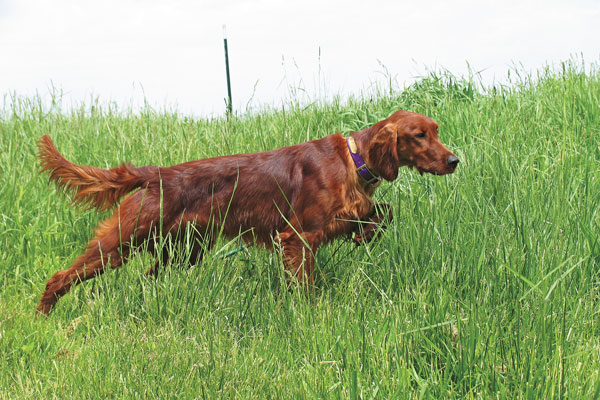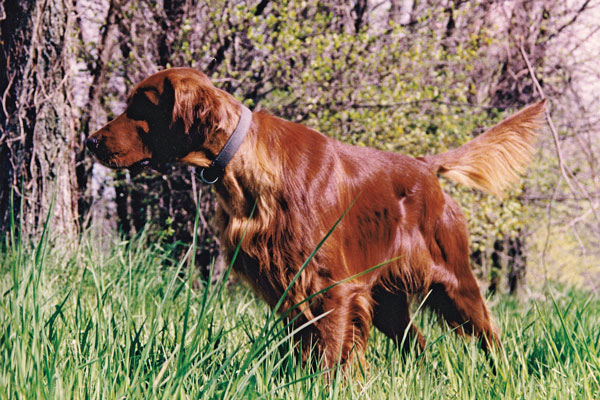 Not long ago, bird hunters viewed the traditional Irish setter with disdain. They were called "Irish airheads"—and worse—by sportsmen convinced that show dog fanciers had bred all the brains and hunting instincts out of what had once been a glorious breed in the field. And in truth, a fair amount of this derision was deserved.
Not long ago, bird hunters viewed the traditional Irish setter with disdain. They were called "Irish airheads"—and worse—by sportsmen convinced that show dog fanciers had bred all the brains and hunting instincts out of what had once been a glorious breed in the field. And in truth, a fair amount of this derision was deserved.
Many Irish setters were easily excited and even more easily distracted, which added to the breed's scatterbrained reputation. If you wanted an Irish setter, it was said, you had to choose between a beautiful dog that was the target of ridicule or one that could hunt up a storm but was far removed from the breed standard.
Not all of the blame lay with the whims of fashion in the show ring, however. A far more significant factor was the rise in popularity of the breed in the early 1960s. "Irish setters became very popular after the 1962 release of the Walt Disney movie. All of a sudden thousands of people wanted their own Big Red," recalls Wendy Czarnecki who, with her husband Matt, has had two dual champion (field and show) setters in addition to several that achieved champion-with-a-hunt-test-title status.
"Then when Richard Nixon was elected president and his King Timahoe was seen romping on the White House lawn and loping among the dunes on San Clemente, the dam burst," Czarnecki continued. "The ensuing flood carried the breed to third place on the AKC's list of popular dogs by the 1970s. The demand seemed inexhaustible and indiscriminate breeding became common.
"Dogs of inferior mental stability and physical soundness were bred and people who never should have owned Irish setters fell prey to that glorious red coat and high spirits. Eventually, the bottom fell out of the Irish puppy market and that, perhaps, was the breed's salvation. When no one wanted to buy their pups any longer the opportunists quickly abandoned the breed, leaving it in the hands of the responsible breeders."
It took quite a while for the breed to recover from the curse of fashion and popularity, but much has changed in the last 30 years as a dedicated—some might say foolhardy—group of people have said "There's no reason why an Irish setter can't be the beautiful animal the standard describes and still stand out in the field."
Start A Revolution
The result has been several dual-champion Irish in the past 15 years and a significant number that have achieved champion/master hunter status along with a lot of dogs with either a senior or junior hunter title. I was fortunate enough to be judging hunt tests for pointing breeds at the beginning of this revolution.
It was one of the real pleasures of judging when an Irish that met the breed standard and could do a nice job in the field came to the line. The ones with good conformation and solid bird sense simply flowed through the field, painting a gorgeous picture as they searched for birds.
This resurgence led to hunters no longer having to choose between a "pretty" or "birdy" Irish setter. If you do the research and are patient, you can have both. That's not to say an Irish setter is the dog for everyone. If you think a gun dog should live in a kennel, this breed is not for you.
"Irish setters like to be part of the family," says Cassie Allen, who has owned two dual champs and another field champion that has earned points in the show ring. "They do best when they are included in the home and treated as your hunting partner, not as some four-footed tool.
"They are best suited to hunters looking for a companion in the house and field. They adapt quite quickly to their surroundings. I can take one of my field-trial dogs out on foot and they adjust their range to my pace. If I hunt them in the woods, they work much closer to me than in an open field. A lot depends on how you train. I've had hunters use my dogs for everything from turkey hunting to retrieving waterfowl."
Jeannie Wagner, who has bred, owned and handled several Irish that have either achieved dual champion status or are champions with a hunt-test title, offers a similar opinion. "Irish setters are family dogs and they love children," she says. "But while they love everyone, they are very loyal to their owners and prefer working for them. Because of this, you don't see many Irish on a professional trainer's string.
"While they may go to a pro for basic training, once that's complete, they return home to their owner who then can run them in competitive events or hunt with them. They adapt well either to hunters walking behind their dogs or to horseback handling in trials. They seem to know that when their handler is on the ground, they need to stay closer."
If you want both "pretty" and "birdy," you have to do a little hunting yourself. There's still a significant split between "show" and "field" Irish, although great strides have been made within the breed in recognizing the importance of form and function.
"There has been much more interest on the 'show' side in recent years to see if their dogs have the ability to hunt. This is a real positive for the breed as a whole," says Cassie Allen. "I'm seeing more hunt-test titles at the end of champion dogs' names. It's best to find a breeder with a litter that has generations of field- or hunt-test titles and show championships behind it."
Wagner agrees. "We're seeing more breeders crossing show lines with either dual or field lines to reestablish the genetic instincts for hunting birds. But you must look at the pedigrees. A good mix of field championships, hunt-test titles, conformation championships and even obedience titles will almost always give you a pup that will be trainable, meet the breed standard and have the necessary hunting instincts.
"The pool of breeders dedicated to producing quality Irish that are capable of success in both the show ring and the field is growing. A Google search for breeders producing dual-titled Irish is a good place to start and most of us have links to other breeders on our websites. We'll refer you to someone. Ask for pictures of the dogs working or visit the breeder and meet the dogs."
Staying Positive
While these dual Irish may look slightly different from many pure show dogs, and certainly differ considerably in appearance from most of the pure field types, they do have the setter's soft temperament. This means they respond better to positive reinforcement than heavy-handed force.
"My dogs hate repetition," observes Cassie Allen. "So once they show you they understand, you move on or they will move on without you. Then both you and the dog get frustrated and that's when many people will start saying how stupid the dog is. The plain truth is this: You have just been outsmarted by your Irish.
"They do mature slowly so you cannot push a young dog. But I'm not saying to ignore bad habits and they will just disappear. This is a very smart breed. I always tell my puppy buyers, 'Do not let them learn anything you do not want to live with for the rest of their life.' These guys just do not forget."
Jeannie Wagner adds Irish setters work best for an owner who handles kindly but firmly and they do not respond well to heavy-handed training methods. "Used properly, they will not resent an electronic collar in the breaking process," she notes. "Sometimes, they respond better to this 'distance-type' correction rather than something up close and personal. Once they have learned the lesson, however, they feel insulted if you continue to badger them.
"They also quickly learn to recognize when they are being set up in a training situation. They are very smart and often out-think their owners. A good rule of thumb with an Irish is never let them get by with doing anything that you may not want them to do at a later time, because if it was OK once, they'll continue to push and try again.
"But the good thing about an Irish setter and one of the things that make this breed really special is that once they are trained, they never forget and you don't have to continually go back and retrain them before a hunting season."
Wendy Czarnecki adds, "I view an Irish setter as being a kid in a dog suit. You definitely have to have a sense of humor to live with an Irish. But they are rapid learners who generally wish to please their owners. However, it is important you don't let their soft looks and sad eyes fool you into believing you cannot enforce their training.
"Severe corrections are rarely necessary and can result in the dog turning you off instead of mending their ways. Most Irish are direct and honest dogs that will accept an appropriate correction and change their behavior. But there are some that can be rather sneaky and find alternative ways to achieve their desires when your attention is elsewhere."







